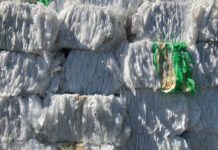
With research showing that polypropylene (PP) film is readily recyclable, industry needs to plan a viable solution to recover the 100,000 tonnes of this packaging material put on the market every year in the UK, urges resource recovery specialist Axion.
PP film, used mainly in food packaging such as biscuit and crisp packets, is not currently collected in sufficient quantities and recycled. Yet studies have shown that this material could be recovered and used in a wide range of injection-moulding or extrusion applications, such as non-food packaging, pipes, transit packaging and automotive parts, according to Richard McKinlay, Axion’s Head of Circular Economy.
“Industry needs to devise a solution as there is a considerable amount of this material used in packaging. Although it can be sorted and separated, the correct infrastructure is needed so that PP film can be collected in significant volumes through household kerbside collections, be reprocessed and reused in applications outside of flexibles,” he says.
The real benefit of PP is the ability to modify the flow characteristics and take it from a film to an injection-moulded rigid item, such as packaging for non-food application or high value, performance products such as automotive parts.
Richard explains that it is not necessary to swap PP for PE, saying: “We do not have a suitable recycling structure for post-consumer household PE films and Europe has a surplus of low grade films. The current trend to substitute PP for PE in small format primary packaging is not beneficial from a recycling viewpoint. PE is no easier to recycle, and the issue isn’t from the material but in the difficulty and collecting, separating and cleaning primary packaging formats.
“From a technical point of view, PP films offer greater flexibility at end of life. The difficulty with LDPE films is that you cannot modify the melt characteristics, and so you have to recycle it back into film, which is very demanding from a quality point of view.”
One solution could be to blend the small format household PE and PP films to produce an injection-moulding or extrusion grade polymer. Axion is currently involved in a WRAP project researching end markets for a PE/PP blended material that could potentially go back into rigid applications.
Richard adds: “Many companies have signed up to the WRAP Plastic Pact that will create a circular economy for plastic. By 2025, the targets are 100% of packaging to be reusable, recyclable or compostable and 70% of plastic packaging effectively recycled or composted. If we are to hit those targets, we need not only a solution for film, but a solution for PP film.
“Recycling PP packaging would help prevent its export and give the material a value, which should help stop it escaping into the natural environment.”
Axion develops and operates innovative resource recovery and processing solutions for recycling waste materials. Its team has expertise in packaging recycling and can offer a packaging recyclability training service to help clients better understand current infrastructure and packaging options in terms of circular economy and end-of-life solutions.
Axion works with a wide range of clients, from Government agencies and local authorities to companies in diverse commercial sectors, on the practical development of new processing and collection methods to recover value from waste resources.







